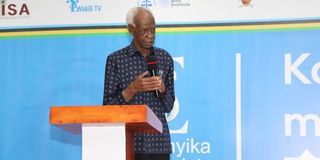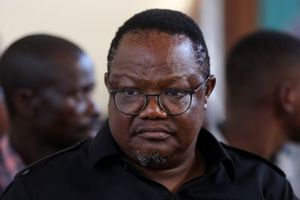Prime
Warioba stands up for judicial autonomy

Former Prime Minister Judge (Rtd) Joseph Warioba speaks during a national forum on Tanzania's 2025 General Election, organised by the Tanganyika Law Society (TLS) on May 3, 2025. PHOTO | COURTESY
What you need to know:
- He expressed concern about some individuals interfering with the judicial process despite the treason case involving Chadema Chairman, Tundu Lissu, being before the court and awaiting judgment.
Dar es Salaam. Retired Judge Joseph Warioba has joined several concerned people in expressing concern over signs of interference with the judiciary, warning that if the situation persists, court decisions may be viewed with suspicion.
Judge Warioba voiced his disappointment on May 3, 2025, during a national forum on Tanzania's 2025 General Election, organised by the Tanganyika Law Society (TLS).
He expressed concern about some individuals interfering with the judicial process despite the treason case involving Chadema Chairman, Tundu Lissu, being before the court and awaiting judgment.
He pointed out that a few days earlier, while watching parliamentary proceedings, he was surprised to see the Attorney General discussing the use of the e-Judiciary system, defending its applicationone of the government’s reasons for requesting that the case be heard online.
“This case is in court, and the Attorney General goes on to discuss it in Parliament!” lamented Judge Warioba.
“Then I saw the Minister of Home Affairs, Innocent Bashungwa, explaining why they want the case to be heard virtually. People must refrain. A court case should not be discussed. Even if the Attorney General was asked about it, he should have simply responded that the matter is before the court,” he added.
This can easily mean that the government is exerting pressure, and in such an atmosphere of fear, even the court might hesitate—and even if it delivers a judgment, people might not believe that it was made independently, emphasised Retired Judge Warioba.
Nevertheless, he insisted that whichever procedure is chosen, justice must be served to both the government and the defense.
Mr Bashungwa’s statement on plans to collaborate with the Judiciary to promote the use of the e-Judiciary system to strengthen criminal justice also drew mixed reactions from legal and political experts countrywide.
Mr Bashungwa said the collaboration would be intensified in the face of security threats to help maintain peace and protect citizens and their property.
“Whenever the Police Force receives intelligence reports—whether overt or confidential—such as those related to Chadema demonstrations, Tanzanians are witnesses to the fact that some Chadema leaders openly stated their intention to incite unrest,” he said.
He added: “When the police have such intelligence, they will work with the Judiciary to ensure justice is served, but through the use of technology. When we opt for such measures to prevent chaos on the streets, Tanzanians should understand that these decisions are made in the national interest,” he added, stressing that no one would receive special treatment.
Mr Bashungwa made the remarks on Wednesday, April 30, 2025, in Dodoma while accompanying the Parliamentary Standing Committee on Foreign Affairs, Defence and Security.
However, his comments came as the Kisutu Resident Magistrate’s Court and Chadema’s Lissu remained at odds over whether his case should be conducted physically or virtually—amid fears that a public hearing could trigger unrest.
Mr Lissu is being held at Ukonga Prison on non-bailable treason charges, stemming from remarks made on April 4, 2025, in which he warned against what he described as blind participation in this year’s General Election without prior electoral reforms.
Mr Bashungwa’s remarks sparked debate among legal and political commentators, with some arguing that his position could be viewed as interference with judicial independence, especially as Mr Lissu contests his right to a physical court appearance.
However, others supported the Minister’s position, stating that it fell within his mandate to ensure public safety, and commended his remarks as timely.
“Naked interference in Judicial Proceedings, with a Court Ruling due on the very same issue for delivery of the case on May 6, this year, an ill-advised Minister spills the beans,” wrote one of Mr Lissu’s advocates, Peter Kibatala, shortly after Mr Bashungwa’s statement.
He added, “Rule 4 of Government Notice No. 637 of 2021 empowers a court to act on its motion; and yet you are telling us that the Police Force can have a role in such determinations.”
According to him, they will wait to see if the Kisutu Resident Magistrate’s Court has anything to say in response: "We will certainly pose the question.”
The former Tanganyika Law Society (TLS) President, Mr John Seka, described the statement as somewhat confusing.
"I believe the minister’s statement was inaccurate, unless we understand the context in which it was made and whether it was appropriate,” he told The Citizen over the phone.
“If he was specifically referring to Lissu’s case, it was not the right time to comment, unless he was also addressing other cases," he added.
Independent advocate Dominic Ndunguru stated that the minister was merely expressing his opinion, adding that ultimately, it is the court that must decide how the case should proceed.
"It is not Mr Bashungwa’s responsibility to comment on collaborations. The court is an independent institution, and it cannot interfere with its operations. I believe he was simply sharing his views," he said.




